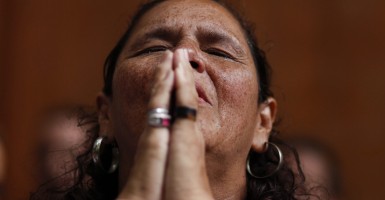A State Department report on religious freedom released in July showed that repression of religious belief is still the norm in Cuba.
The report explains that in Cuba “most religious leaders reported they exercised self-censorship in what they preached during services” because of fear of “government reprisals.”
Moreover, while the State Department recognizes that established religious groups have more ability to exercise their faith, religious freedom is not truly guaranteed by the government as groups have to register with the Ministry of Justice in order to be officially recognized. Religious groups are also monitored by the Office of Religious Affairs (ORA) and by extension government sponsored religious groups. Such groups are essentially the same as the governing Cuban Communist Party.
The Ladies in White is a perfect example of how restrictions on religious activities are still prevalent in the island. The Ladies is a group of wives, mothers, daughters and other female relatives of the 75 peaceful dissidents that were unjustly arrested in Cuba’s “Black Spring” in 2003.
Most of the people arrested were prominent journalists and some of them were doctors, librarians, and human right activists. Among those arrested was Dr. Oscar Biscet, a Catholic who exposed the reality behind Cuba’s medical advancements, primarily its low infant mortality rates. Problematic pregnancies, including late-term pregnancies, are coercively terminated.
The Ladies in White was originally formed as a peaceful movement against the false imprisonment of their relatives, but it has evolved into a freedom movement for Cuba. They advocate for freedom in the island by attending mass every Sunday wearing white clothes and holding a silent vigil afterwards. Virtually every Sunday since 2003, the regime has repeatedly harassed, arrested and beaten these women to prevent them from carrying out their peaceful protests.
The regime’s repression of religious freedom can also be seen in the case of Armando Valladares, who served 22 years in a Cuban prison for refusing to compromise his religious and political beliefs in favor of the communist revolution. After reading his memoir, President Ronald Reagan appointed him as the U.S. ambassador to the United Nations’ Human Rights Commission (UNHCR).
The end of the Cold War did not stop communism’s persecutions of religious groups. The U.S. should continue promoting freedom throughout oppressed communities in the world.




























